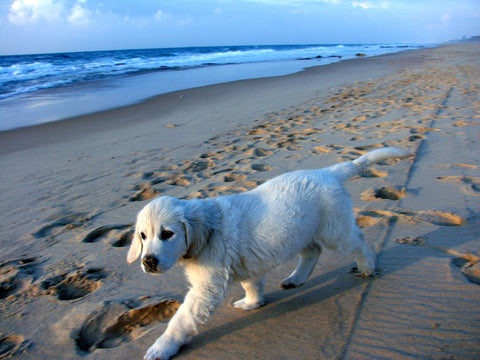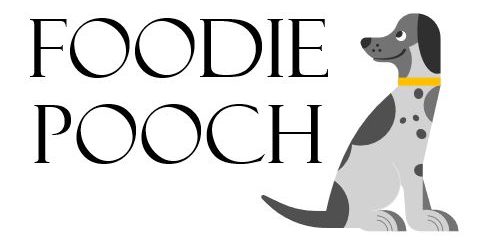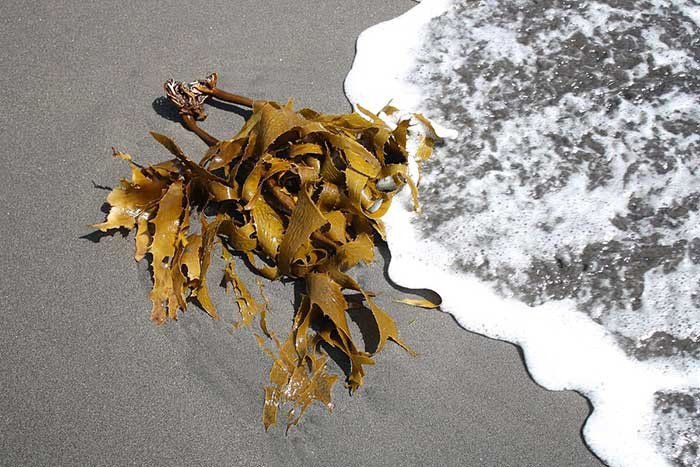6 Benefits of Kelp for Dogs – A Sea Superpower!
As a dog lover I’m sure you’re always on the hunt for ways to improve the health and wellbeing of your dog.
So let’s look at sea kelp, and how this natural ingredient from the sea can help prevent anal gland problems, arthritis, and even repel fleas.
What is sea kelp?
Kelp is a seaweed, and is a widely recognised nutrient supplement for human beings.

Sea kelp contains salts and minerals which are good for the health of both us and our dogs. In fact, some Australian holistic veterinarians are now recommending kelp as part of a dog’s diet.
How to feed your dog kelp
We’ll cover how much to feed your dog on a per kg basis later, but it’s important to address some key points before we look at all the benefits.
Kelp is rich in vitamins and minerals, and also iodine. Too much can be problematic for our dogs, so we need to make sure not to overdo it.
We also need to use caution with fresh kelp brought from various sources.
Kelp gathered close to the shoreline may absorb dangerous contaminants from pollution, and we may not be aware where the kelp was sourced. Kelp sourced from the deep ocean is what we need.
There are two good ways of feeding kelp to our dogs – dietary supplements (usually in capsule form or part of a food blend), or by feeding a high-end dog food which contains kelp.
Australian air-dried dog food Eureka is one of the few containing kelp, and there’s a good review here.
6 Benefits of Kelp in your dog’s diet
Here are 6 benefits of adding kelp to your dog’s diet which may surprise you:
#1 Kelp has been found to reduce dental plaque and tarter buildup in dogs.
Swedish studies have shown that kelp supplements reduce dental plaque and tarter buildup in dogs within a few weeks.
Some English research indicates the effect may be due to a bacteria, Bacillus lichenformis, which resides on the surfaces of the kelp and releases an enzyme that breaks down the plaque coating on the teeth.
#2 Kelp is rich in iodine
Iodine is a chemical element necessary (at least in trace amounts) to prevent a condition called hypothyroidism in dogs (it is called goiter in human beings).
If your dog becomes listless, develops a limp or coordination problems, or in extreme conditions, develops a tumorous growth where the thyroid gland should be, it could be hypothyroidism.
The iodine-deprived thyroid gland can result in a whole range of nervous problems as well as developmental disabilities in dogs.
#3 Kelp contains a rich natural mix of salts and minerals
The mix of salts and minerals (including iodine, magnesium, potassium, iron and calcium) in Kelp help keep the dog’s entire glandular system, the pituitary gland, the adrenal gland, as well as the thyroid gland, the glands that regulate metabolism, healthy.
When the glands don’t function property, your dog may fail to develop normally. The anal gland, for example, may function improperly and cause unpleasant odours.
Kelp can be just what you need to reduce the incidence of nasty smell in your house.
#4 Kelp reduces itchiness and skin conditions
Kelp can be an important natural addition to any organic or chemical flea-fighting treatment you have chosen for your dog.
There is substantial evidence that kelp in the dog’s diet will help repel fleas. Some of us already know how frustrating and unpleasant fleas can be, especially in our homes!
Kelp can also reduce itchiness in dogs with skin allergies, and improves the general condition of skin and coat.
If your dog has itchy skin and seems always to be scratching, kelp supplements may make your dog’s life a lot more pleasant.
But please note: If your dog is suffering itchy skin or rashes, I highly advise researching the dog food you’re currently feeding, as I often find they’re the root cause of itchy skin.
#5 Kelp is high in iron and calcium
Kelp can supplement other nutrients in your dog’s diet to prevent iron deficiency and improve the ability of the blood to distribute oxygen to the cells.
Dogs who have kelp in their diet may heal from injury faster because of the iron enrichment. The calcium may additionally help prevent arthritis and bone conditions.
#6 Kelp contains natural amino acids
The amino acids, especially glycine, alanine, arginine, proline, glutamic, and aspartic acids in kelp may support tissue repair.
The Japanese have long maintained that eating seaweed (which is customary in Japan) improves longevity.
There are other benefits of adding kelp to your dog’s diet, but hopefully those key reasons will help you realise how beneficial this seaweed is for our dogs!
If you’re considering feeding fresh kelp to your dog then let’s finish this guide with how much you should feed them:
How much kelp should I feed my dog?
Dr. Barbara Fougere, who advocates natural healing for dogs, says kelp should be given in measured dosages.
Here is a rough guideline of how much kelp you should add to your dog’s food:
- The maximum dosage for small (under 22 kilograms) dogs should be 1/4 teaspoon;
- 1/2 teaspoon for medium-sized dogs, and
- 1 teaspoon for large (over 55 kilograms) dogs.




